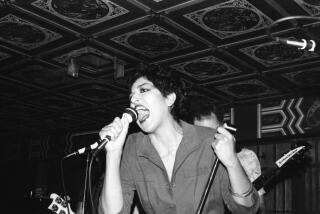Hong Kong Club a Place for Deals, Debate : Business: Movers and shakers get a place to huddle. Project is sparked by fears of poor management after Chinese take control in ’97.
- Share via
HONG KONG — In this bastion of greed, gold and Gucci, where an appreciation of history is often seen as a psychological problem, a new club is bucking the trend by evoking the decadent charm of 1920s’ Shanghai.
It’s the China Club, filled with teak and rosewood, not marble and chrome.
As the speak-easies of old Shanghai gave capitalists, revolutionaries and spies neutral ground for cutting deals, the China Club wants to be the place where communist and capitalist movers and shakers chart Hong Kong’s future. The British colony returns to China’s control in 1997.
“What better place to do it than here over a steaming bowl of congee ,” said David Tang, 37, the co-owner. Congee is rice porridge.
Tang pointed to the great dining room with its huge white columns, blackwood furniture, rosewood paneling and paintings by modern Chinese artists.
A Mao-suited waiter stood at attention near a slowly rotating fan pointed at two Chinese men huddled over tea in a corner.
“This is a middle ground between us and them, between now and then,” Tang intoned.
He said many communist officials already had joined the club, but would not say whether all had paid the $15,500 entry fee. When the club opened on Sept. 8, China’s top diplomat in the territory, Zhou Nan, cut the ribbon.
“I want to educate the communists,” Tang said in an Oxford accent, puffing on a cigar. “If they are going to run Hong Kong, it is important that they know about the good things in life.”
Many businessmen worry that poor Chinese management will affect the economy after Hong Kong reverts to China’s control, although Beijing has promised not to change the economic system for 50 years.
Investors led by Tang spent $6 million to construct the club on the top three floors of Hong Kong’s only Stalinist-style building, the old Bank of China erected in the early 1950s.
They imported more than 35 tons of wood and purchased a 5,500-volume library specializing in China. From a London club, for the top-floor den, they brought a 150-year-old leather couch that is losing its stuffing.
“I wanted to create nostalgia, the sound of whirring fans, creaking floors,” Tang said. “I think there’s nothing worse than being common.”
James Wong, an advertising executive, talk show host and songwriter, was all in favor.
“Hong Kong is a place where there’s no yesterday and no tomorrow, only today,” he said. “This place brings back yesterday.”
During China’s Cultural Revolution of the 1960s, when anti-capitalist propaganda was at its height, the club’s premises were headquarters for Chinese radicals who plotted riots that rocked the colony.
Times have changed.
On the club’s balcony, where communists once harangued the masses below, their latter-day comrades patter around in Gucci loafers, sipping drinks and making deals with Hong Kong’s capitalist elite.
“The club is good thing for the communists,” said Jimmy McGregor, a prominent Hong Kong banker. “They need to relax with us and we with them.”
McGregor remembers playing cricket next door to the building in the 1950s.
“Then our greatest desire was to thump a ball through a window of the Bank of China,” he said. “It needed a mighty swat.”
More to Read
Sign up for Essential California
The most important California stories and recommendations in your inbox every morning.
You may occasionally receive promotional content from the Los Angeles Times.










